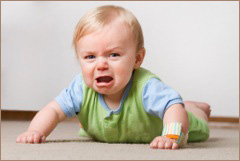This course meets the requirement for coursework and training in pediatric abusive head trauma/Shaken Baby Syndrome. ATrain Education is accredited as a provider of continuing nursing education through the Kentucky Board of Registered Nursing.
Authors:
Fran Laughton, RN, PHN, MSN, FNP
Lauren Robertson, BA, MPT
Contact hours: 2.5
Expiration date: September 1, 2026
Course price: $25
Course Summary
This course defines shaken baby syndrome (SBS) and abusive head injury (AHT); reports on Kentucky law regarding child abuse, neglect, and physical injury; presents triggers and risk factors for SBS; summarizes the clinical presentation and diagnosis of SBS; and discusses intervention strategies and education campaigns to prevent abuse
Criteria for Successful Completion
Study the course material, achieve a score of 80% or higher on the post test (the post test can be repeated if a learner scores less than 80%), complete the course evaluation, and pay where required. No partial credit will be awarded.
Accreditation
To find specific accreditations or approvals, click here.
Course Objectives
When you finish this course you will be able to:
- Define pediatric abusive head injury and shaken baby syndrome.
- Comment on the evolution of society’s recognition of child abuse and explain the Child Abuse Prevention and Treatment Act (CAPTA).
- Explain the definitions of abuse, neglect, and physical injury in Kentucky law.
- Relate the child maltreatment reporting requirements under Kentucky law.
- Outline the incidence of abusive head trauma in the U.S. and in Kentucky.
- Describe the most common triggers and risk factors for shaking a baby and summarize factors that protect against pediatric abusive head trauma.
- Summarize the clinical presentation and diagnosis of shaken baby syndrome.
- Discuss intervention strategies and educational campaigns intended to prevent SBS.
- Compare and contrast the primary schools of thought concerning the degree and type of force needed to cause the injuries seen in SBS.

